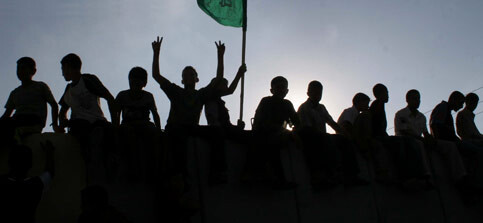The Electronic Intifada 23 September 2007

Hamas supporters attend a protest in front of the closed Rafah border crossing, September 2007. (Hatem Omar/MaanImages)
While largely unnoticed in American discourse on the topic, much has been said and written to debunk the sanctions regime imposed on Hamas government administrations since its resounding victory in the Palestinian Legislative Council (PLC) elections of January 2006. These calls and reports show with compelling logic that the sanctions regime is wrong and misguided and, equally important, that it is a reaction to the excessively intense pressure that the US administration has exercised over other nations to induce them to boycott and besiege a government democratically elected by the people and to punish the Palestinians for their democratic choice. The Quartet has been spearheading this campaign of isolation against Hamas, and in the process is advancing a US-Israeli agenda whose goal is to delegitimize Hamas and prevent it from exercising its right to lead the Palestinian people, even though the latter have elected it in a transparent, internationally monitored electoral process. A variety of underhanded methods, both internal and external, have been used to undermine the Hamas-led government, including destabilization from within the fragile Palestinian political system.
The US government expected the first Hamas government to fall in under three months. When that didn’t happen, Washington delegated to a faction inside Fatah the responsibility of overthrowing Ismail Haniyeh’s government, an effort aimed at reinstalling Fatah. Hamas’ ability to rule has been hampered, indeed paralyzed, by crippling Western pressures, which have only been strengthened by the collaboration of regional powers as well as local Palestinian players.
In both of its roles, as a government and as a political movement, Hamas has tried to avert local feuding and bloodletting, sometimes with the help of the Egyptian security delegation that was stationed in Gaza and at other times through coordination with other Palestinian groups. Yet all of these attempts, genuine and persistent as they have been, crashed into the iron wall of international sanctions and local machinations and power plays.
Within Fatah, hostility to Hamas and its victory is not universal. Some Fatah members do accept the legitimacy of the Hamas government and recognize the need to accept the results of the elections, knowing full well that this will only nurture and reinforce Palestinian democracy and advance the goals of Palestinian nationalism and national unity.
Today, many attempts are underway to lift the siege that has been imposed on Hamas, and to integrate the organization into the political process. Those who are involved in these attempts realize that Hamas is a key political player that cannot be ignored or swept aside. They also know that no political progress in the direction of a political settlement can be achieved without the endorsement and approval of Hamas. Numerous official and semi-official organizations and groups, both Western and international, have come to this conclusion, as is amply reflected in their repeated calls for positive and proactive engagement with Hamas.
On August 13, the Foreign Affairs Committee (FAC) of the British House of Commons urged all parties to exercise maximum efforts to form a national unity government in the occupied Palestinian territories that will include Hamas. The report further recommended that the British government engage moderate elements within the movement.
The day before that, the Italian prime minister, Romano Prodi, stressed “the need to conduct a dialogue with Hamas so as to help Hamas develop politically, in view of the fact that Hamas is a fact on the ground.” And on 2 August, the International Crisis Group issued a report in which it questioned the feasibility of enforcing law and order and bringing about a political settlement based on a two-state solution in the absence of national unity among the Palestinians. That report cast doubt about the ability of Palestinian President Mahmoud Abbas to secure a cease-fire with Israel and reach a political settlement in the absence of Hamas.
These attempts and these calls have not been launched in a vacuum. Rather, they were preceded by many meetings, behind the scenes, in different European capitals. Western participants in those meetings were introduced to the political thinking of Hamas and to the movement’s most senior leaders. If these meetings demonstrate anything, they demonstrate the fact that many in the West genuinely believe that the international community can do business with Hamas.
Hamas is an integral part of the Palestinian political landscape. It is a mainstream Islamic movement that is committed to the principles of democracy and legitimate and peaceful political participation on an equal footing for all Palestinian groups. The movement has deep roots in various sectors of Palestinian society. Isolating Hamas is not a feasible political option because the movement represents a very wide segment of Palestinian society, a fact that was clearly manifested in the elections of January 2006. Former US secretary of state Colin Powell recognized this when he called, in a recent interview with National Public Radio, for the need to find a way to engage with Hamas.
Hamas is a bulwark in the face of radical and militant ideas and trends. Policies whose aim is the isolation or marginalization of Hamas will not only fail but will also set the stage for the spread of extremist thinking in occupied Palestine. Allowing Hamas to participate in the Palestinian political process will encourage the growth and development of pragmatic ideas and instruments of political action. It will also allow tolerance and respect for pluralism and diversity to strike root in Palestinian political culture. The West should ask itself whether it wants the moderation and realism of Hamas or the dogmatism of radical groups that subscribe to the clash of civilizations theory.
Dr. Ahmed Yousef is a political advisor to Palestinian Prime Minister Ismail Haniyeh. This commentary was originally published by Haaretz and is republished with permission.
Related Links



